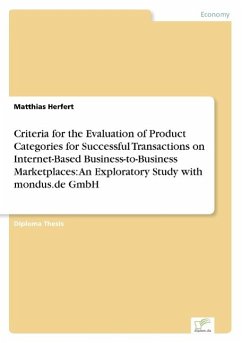Diploma Thesis from the year 2000 in the subject Business economics - Marketing, Corporate Communication, CRM, Market Research, Social Media, grade: 1,3, Leipzig Graduate School of Management (unbekannt), language: English, abstract: Inhaltsangabe:Abstract:
The Internet plays an important role of today s management decision-making. Great opportunities have to be weighted against investments into knowledge, technology, and organizational restructuring. Often, great uncertainty is involved because of rapidly changing technologies and mutual dependence of transaction parties on each other s degree of technology adoption. The main advantage of electronically performed activities is its improved efficiency. In the past, business-to-business applications have been based on specific investments of individual firms that attempted to gain competitive advantages from proprietary electronic data interchange (EDI). However, investments were huge and flexibility was very limited. Nowadays, Internet technologies allow for global reach, ubiquity, and improved efficiency at reduced asset specificity. One business application of Internet technologies is the independent business-to-business Internet-based marketplace (IBMP), on which buyers and sellers can perform service, product, information, and money transactions. Due to the early stage of technology adoption, the suitability of specific IBMP-transactions is often unclear and all those actors involved have to make strategic decisions concerning the way in which future product transactions will be performed. With the help of this thesis, buyers, sellers, and marketplace providers can evaluate the transactional suitability of product categories. Such an evaluation is of particular importance to small- and medium-sized enterprises (SME). They often lack automation and economies of scale. Therefore, the potential of improved efficiency through Internet technologies is here especially high. An exploratory study with the IBMP mondus has allowed for an empirical testing of selected evaluation criteria within selected product categories. The final results of the application explain the complexity of the decision situation and the remaining uncertainty due to the early stage of technology adoption.
Inhaltsverzeichnis:Table of Contents:
Management SummaryI
ContentsII
List of Abbreviations & SymbolsIV
List of FiguresVIII
List of TablesVIII
1.Introduction1
1.1.The Gap between Present Knowledge and Desired Competence1
1.2.The Research Concept2
1.2.1.Specification of Objectives2
1.2.2.Approach and Procedure3
1.2.3.Empirical Evidence3
1.2.3.1.Small- and Medium-Sized Enterprises4
1.2.3.2.The Company mondus ltd.4
1.3.Structure of the Paper5
2.Old Economy-Based Coherencies6
2.1.The Nature of Markets7
2.2.The Nature of Products7
2.2.1.A Product Typology8
2.2.2.The Scope of Product Definition8
2.3.The Nature of Transactions10
2.3.1.Objective of Transactions10
2.3.2.Transaction Process12
2.3.2.1.Stages of Transactions12
2.3.2.2.Components of Transactions13
2.3.2.2.The Role of Uncertainty13
2.3.3.Transaction Cost Economics13
2.3.3.1.Accentuation on Organization16
2.3.3.2.Elements of Transaction Cost Analysis17
2.3.3.3.Practical Application19
2.4.Theoretical Emphases20
2.4.1.Contribution-Inducement Concept20
2.4.2.Gratification Theory and Theory of Learning21
2.4.4.Interaction Theory22
2.4.5.Game Theory22
2.4.6.Decision Theory23
3.New Economy-Based Coherencies25
3.1.The Electronic Marketspace25
3.1.1.The Media Model25
3.1.2.The Internet as Business Media26
3.2.The Electronic Marketplace27
3.2.1.Electronic Commerce and the Role of Interfirm Relations28
3.2.2.Internet-Based Business-to-Business Marketplaces30
4.Structuring Tran...
Hinweis: Dieser Artikel kann nur an eine deutsche Lieferadresse ausgeliefert werden.
The Internet plays an important role of today s management decision-making. Great opportunities have to be weighted against investments into knowledge, technology, and organizational restructuring. Often, great uncertainty is involved because of rapidly changing technologies and mutual dependence of transaction parties on each other s degree of technology adoption. The main advantage of electronically performed activities is its improved efficiency. In the past, business-to-business applications have been based on specific investments of individual firms that attempted to gain competitive advantages from proprietary electronic data interchange (EDI). However, investments were huge and flexibility was very limited. Nowadays, Internet technologies allow for global reach, ubiquity, and improved efficiency at reduced asset specificity. One business application of Internet technologies is the independent business-to-business Internet-based marketplace (IBMP), on which buyers and sellers can perform service, product, information, and money transactions. Due to the early stage of technology adoption, the suitability of specific IBMP-transactions is often unclear and all those actors involved have to make strategic decisions concerning the way in which future product transactions will be performed. With the help of this thesis, buyers, sellers, and marketplace providers can evaluate the transactional suitability of product categories. Such an evaluation is of particular importance to small- and medium-sized enterprises (SME). They often lack automation and economies of scale. Therefore, the potential of improved efficiency through Internet technologies is here especially high. An exploratory study with the IBMP mondus has allowed for an empirical testing of selected evaluation criteria within selected product categories. The final results of the application explain the complexity of the decision situation and the remaining uncertainty due to the early stage of technology adoption.
Inhaltsverzeichnis:Table of Contents:
Management SummaryI
ContentsII
List of Abbreviations & SymbolsIV
List of FiguresVIII
List of TablesVIII
1.Introduction1
1.1.The Gap between Present Knowledge and Desired Competence1
1.2.The Research Concept2
1.2.1.Specification of Objectives2
1.2.2.Approach and Procedure3
1.2.3.Empirical Evidence3
1.2.3.1.Small- and Medium-Sized Enterprises4
1.2.3.2.The Company mondus ltd.4
1.3.Structure of the Paper5
2.Old Economy-Based Coherencies6
2.1.The Nature of Markets7
2.2.The Nature of Products7
2.2.1.A Product Typology8
2.2.2.The Scope of Product Definition8
2.3.The Nature of Transactions10
2.3.1.Objective of Transactions10
2.3.2.Transaction Process12
2.3.2.1.Stages of Transactions12
2.3.2.2.Components of Transactions13
2.3.2.2.The Role of Uncertainty13
2.3.3.Transaction Cost Economics13
2.3.3.1.Accentuation on Organization16
2.3.3.2.Elements of Transaction Cost Analysis17
2.3.3.3.Practical Application19
2.4.Theoretical Emphases20
2.4.1.Contribution-Inducement Concept20
2.4.2.Gratification Theory and Theory of Learning21
2.4.4.Interaction Theory22
2.4.5.Game Theory22
2.4.6.Decision Theory23
3.New Economy-Based Coherencies25
3.1.The Electronic Marketspace25
3.1.1.The Media Model25
3.1.2.The Internet as Business Media26
3.2.The Electronic Marketplace27
3.2.1.Electronic Commerce and the Role of Interfirm Relations28
3.2.2.Internet-Based Business-to-Business Marketplaces30
4.Structuring Tran...
Hinweis: Dieser Artikel kann nur an eine deutsche Lieferadresse ausgeliefert werden.







